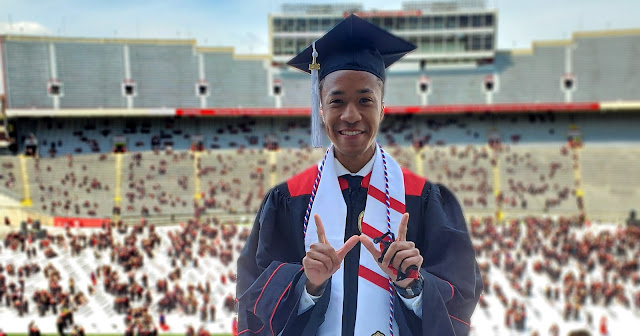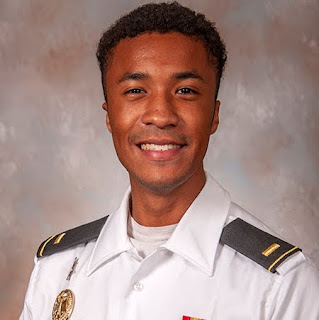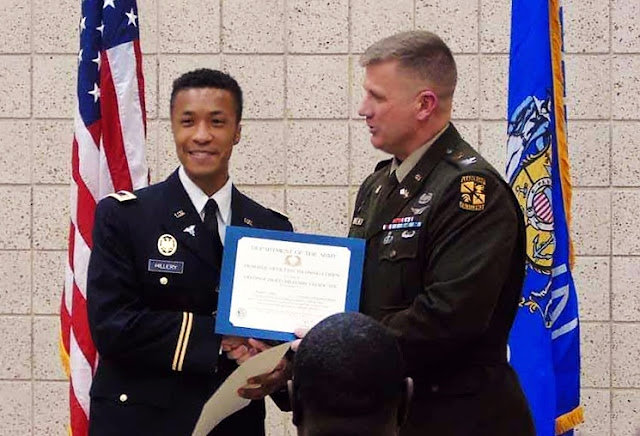Building Strength through Challenges: The Journey of Brandon Hillery
By Vivian Mason
[Editor’s Note: This article is the third of a four-part series profiling USU medical students and their medical school journeys to commemorate Black History Month.]
“You always want to outwork your potential. As hard as you believe you can work, you can work harder than that.” ― Kobe Bryant
Army 2nd Lt. Brandon Hillery has often found himself as the “first” or the “only” throughout his life. Hillery started as the first Black male in his ROTC program; the only Black cadet in his National Guard unit. He was the only Black person in his college orchestra and his choir. Lately, however, “first” has taken on another form: Hillery now studies as a first-year medical student at the Uniformed Services University’s F. Edward Hébert School of Medicine, working hard to achieve his dream of becoming a surgeon despite the many challenges he has faced in his life.
“I remember waking up to a hail of gunshots right outside of our house because a neighborhood party went haywire,” Hillery recalls. His family took cover and later discovered that a bullet had gone through their mailbox.
The mother figure in Hillery’s life wasn’t his Korean birth mother, but rather a stepmother he describes as abusive. His father, Hillery adds, was raised in a background similar to his own, and wrestled with mental health issues as a result of the experience.
“When my dad was in his depressive state, I truly had no one. I felt very alone back then,” Hillery admits. “I can’t say that I ever had a role model, but somehow I knew that I was going to be successful. I was always able to push through whatever barriers were in my way. I made a promise to myself that I would attain my goal of becoming a doctor despite what others said.”
Despite grappling with his mental health challenges, Hillery’s father still made it a point to provide more opportunities to his son when he could - moving to a new school district and driving him to school every day in pursuit of even the smallest bit of extra potential.
Hillery’s initial interest in healthcare was primarily influenced by his father, who had worked as a nurse following his service in the Army. “When I was young,” Hillery notes, “my dad told me that doctors help people, and I knew I wanted to do that.” His father also stressed the value of education and encouraged him to study and work hard.
He adds that the negative aspects of his life actually drove him to work harder. “More than anything, they guided me to know what not to do.”
Instead of succumbing to his environment, Hillery let it fuel his success, graduating from high school and attending the University of Wisconsin–Madison, where he majored in biology. “I took advantage of every opportunity that came my way and developed my skills,” Hillery remarks. “I searched for research opportunities and worked in a neurology lab.”
Hillery joined a simultaneous membership program for both the National Guard and ROTC in his sophomore year of college, which very few cadets do. This allowed him to obtain a Minuteman Scholarship to pay for his college education. Not one to take on a challenge lightly, Hillery also trained and competed with all of the Army challenge teams that he possibly could, doing physically demanding activities like the Bataan Death March (a 26-mile ruck with a 40-lb backpack over a marathon distance), and was chosen as the only member in his battalion to attend the Cold Weather Orientation Course, a program that required survival in below zero weather in the snow.
In his personal time, Hillery found ways to escape through singing in his college choir, playing first chair violin for a medical orchestra, and playing with semi-pro/pro soccer players from around the world.
“I know that I have to put my full effort into creating a better future for myself,” Hillery reflects. “It was pretty crazy sometimes, but it developed me as a person. I knew that I wanted to continue with the military. It’s my dream to make the most impact that I can as a doctor because I want to leave a legacy by helping soldiers and local communities.”
It was this work ethic and determination—with plenty of encouragement from mentors and teachers throughout his life—that brought Hillery to USU and while his first year has been a challenge, he describes the experience of attending with the utmost reverence.
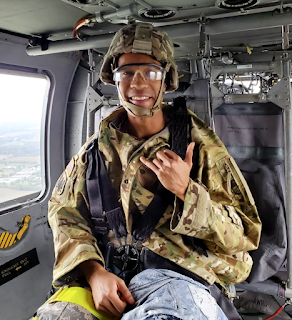 |
2nd Lt. Hillery flying in a Blackhawk as part of the Bushmaster field exercise at USU. (Photo credit: Courtesy of Army 2nd Lt. Brandon Hillery, USU) |
community is really special. It’s like a big family, and everyone’s ready and willing to help each other. I think that’s phenomenal. I’m not sure if there are any other medical school environments like this. My persistence and willingness to develop myself despite the circumstances that I faced prepared me well for USU.”
His ultimate goal is to become a surgeon, something he’s dreamed about for a long time. “I like the challenge of working with my hands,” Hillery says. “It takes a lot of knowledge and skill to fix a problem that can eventually make a huge impact in someone’s life.”
Hillery finds that he enjoys testing his limits. At USU, he holds leadership positions in the Apollo Society, a performance group that gives students the opportunity to collaborate and perform music with their peers, the Dermatones a cappella group, and the Student National Medical Association, which provides support to underrepresented communities. On top of all of this, Hillery continues to play soccer as part of an amateur-professional team based in Washington, D.C.
He describes the challenge of juggling so many activities as helpful. “I think it helps a lot. You have to be very persistent and not give up. My sense of humor has also been helpful, as well as my ability to stay positive. I want to enjoy what I’m doing and take in all these new experiences, no matter how difficult.”
Hillery is thankful for this opportunity at USU and tries to remember to take a step back and recognize it. “It’s not work when I’m learning,” he offers. “It’s more a rewarding experience, and I wouldn’t want to be anywhere else. I feel like USU is the right fit for me.”
He is quick to acknowledge those mentors and guides – grade school choir, orchestra, and chemistry teachers urging him to learn in preparation for college, his high school track coach that saw his potential and nurtured it, and ROTC, college and pre-med instructors – who fostered his growth and encouraged him along the way.
Hillery said he would like to “pay it forward” by encouraging minority students as well. “There were many times when I was the only minority in the room,” Hillery remarks. His advice: “Don’t hold back from doing something just because you’re the only one. Do it anyway! Be a leader and lead from the front. Face your fears by moving out of your comfort zone. Inspire everyone around you, even those who are different from yourself. Remember, it doesn’t get easier. You get stronger, and you’re capable of more than you think.
“Let your challenges give you strength,” Hillery concludes. “Use any of those experiences as opportunities to learn about yourself and to improve who you are as a person.”
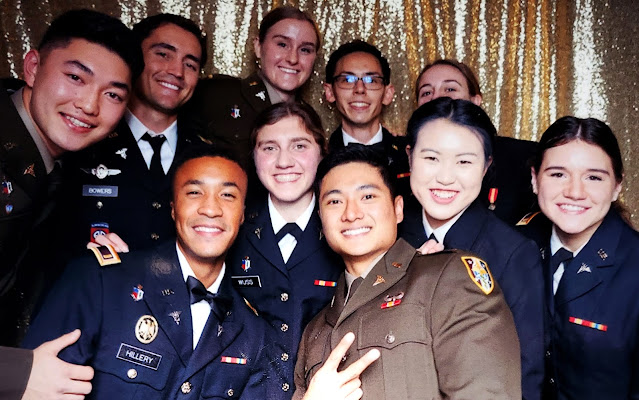 |
2nd Lt. Hillery (front, 2nd from left) and classmates during USU's annual "Dining Out" celebration. (Photo credit: Courtesy of Army 2nd Lt. Brandon Hillery, USU) |

